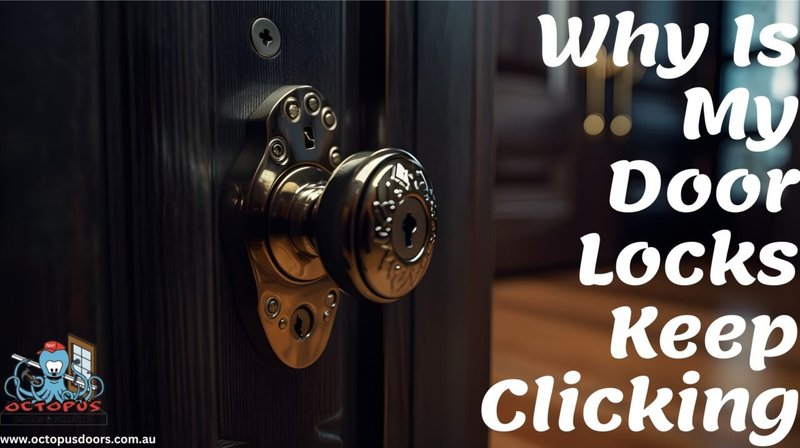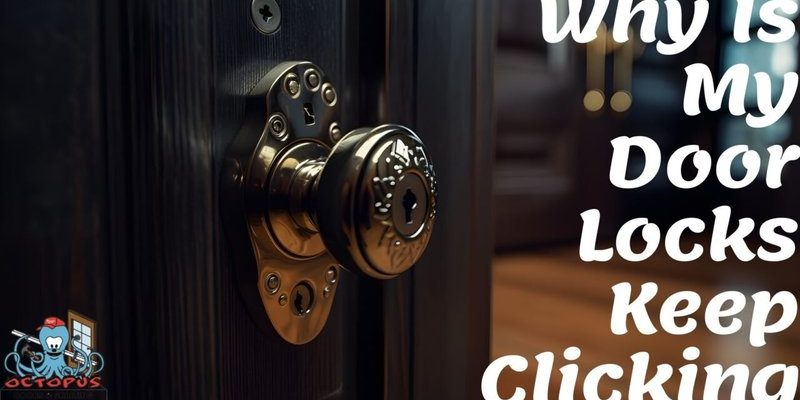
Understanding this odd sound is more than just a curiosity; it’s a clue. That little click can signify a variety of issues. Whether you have a simple privacy knob or a more complex locking mechanism, a clicking sound often points to something that needs fixing. In this article, let’s dive into the reasons behind that pesky clicking and explore some straightforward solutions. So grab your favorite drink, and let’s get to the bottom of this!
What Causes the Clicking Sound?
When your privacy door knob starts clicking, it usually means there’s something amiss inside the mechanism. One common cause is a misalignment between the latch and the strike plate. Imagine trying to fit two puzzle pieces that just don’t match. If the latch isn’t hitting the strike plate correctly, it can create a clicking sound as it tries to engage.
Another reason could be a worn-out spring. Inside the knob, there’s a spring-loaded mechanism that allows the knob to turn smoothly. Over time, this spring can wear out or even break, causing odd noises when the knob is turned. Just like an old rubber band that makes a snap sound when stretched too far, a worn spring can lead to frustrating clicking.
Lastly, there might be loose screws or parts that are no longer tight. A door knob is a mechanical device, and as with any machine, parts can loosen over time. This can lead to movement that produces that annoying click as things shift around.
How to Diagnose the Clicking Issue
To get to the root of the clicking sound, you’ll want to diagnose the problem methodically. Start by checking the alignment of your door knob and latch. Close the door and try turning the knob while looking at where the latch meets the strike plate. If there’s a gap or if they don’t align properly, that could be your culprit.
Next, give the knob a gentle wiggle. If you notice any unusual movement or if the knob feels loose, that’s a sign of loose screws or parts. Most privacy door knobs have screws on the side or underneath. Use a screwdriver to tighten them up, but be careful not to overtighten, as that can also cause issues.
Lastly, if you’re up for it, take the knob apart. Remove it from the door (just a couple screws usually) and inspect the internal components. Look for any signs of wear or damage, particularly the spring. This step might feel a bit daunting, but it’s not as tricky as it sounds.
Fixing a Misaligned Latch
If you discover that misalignment is causing the clicking sound, fixing it is usually a straightforward task. First, loosen the screws on the strike plate, which is the metal piece attached to the door frame. This will allow you to adjust its position slightly.
After loosening the screws, try moving the strike plate up or down until the latch lines up perfectly when the door is closed. Once you have it lined up, tighten the screws back into place. Give the knob a few turns to see if the clicking sound has disappeared. You’ll be surprised how a small adjustment can make a big difference!
If adjusting the strike plate doesn’t solve the problem, consider checking the door hinges as well. Sometimes, a door that’s not hanging straight can create more issues than just a stubborn latch.
Replacing Worn Springs
If your investigation leads you to suspect a worn-out spring, don’t fret—it’s usually an easy fix! Most privacy door knobs come apart with just a few simple steps, as mentioned before. Once you have the knob disassembled, locate the spring. It’s often a thin metal coil that sits inside the knob.
To replace it, you’ll want to find a compatible spring at your local hardware store or online. Bring the old spring with you to ensure you get a perfect match. Installing the new spring is typically just a matter of sliding it into the correct spot, reassembling the knob, and then reattaching it to the door.
This quick replacement can not only eliminate the clicking sound but also improve the overall functionality of your door knob.
Tightening Loose Screws
If your knob is clicking because of loose screws, you’re in luck! This is perhaps the simplest fix of all. Grab a screwdriver—ideally, one that fits the screws in your door knob. Start by checking the screws on the knob itself. Sometimes, these can loosen up from regular use, just like that annoying creaky sound you hear from a chair after a few years.
Once you’ve located the screws, tighten them gently. Avoid going overboard, as this could strip the screw holes. After you’ve tightened those, check the screws on the strike plate and the door hinge as well. Remember, a well-secured door knob not only operates smoothly but also ensures your privacy is protected.
When to Call a Professional
Sometimes, despite your best efforts, the clicking sound persists. It can be frustrating when simple fixes don’t work, and it might leave you wondering, “What now?” If you’ve checked the alignment, replaced the spring, and tightened all screws, yet the problem remains, it might be time to consider calling in a professional.
A locksmith or handyman can provide a deeper inspection and might identify issues you may have missed. They can also help with more complex products, like electronic privacy locks, which can involve intricate wiring and programming.
Remember, your time is valuable. If the door knob is still giving you trouble, seeking professional help can save you from the headache of further DIY attempts.
Preventing Future Issues
Now that you know how to deal with a clicking privacy door knob, let’s talk about prevention. Regular maintenance goes a long way in keeping your door knob in top shape. Here are a few easy steps:
- Regular Inspections: Check your doorknobs periodically for any signs of wear or loosening.
- Clean the Mechanism: Dust and debris can build up inside the knob. A quick clean every few months can help.
- Lubrication: Use a silicon spray or specialized lubricant to keep the mechanism running smoothly.
By staying proactive, you can avoid annoying clicking sounds and ensure your privacy door knob functions perfectly for years to come.
In conclusion, a clicking privacy door knob can be a minor annoyance, but it’s usually a signal that something needs attention. Whether it’s a misaligned latch, a worn spring, or loose screws, the solutions are often straightforward and easy to tackle. With a little patience and some basic tools, you can keep your door knob functioning quietly and smoothly!
